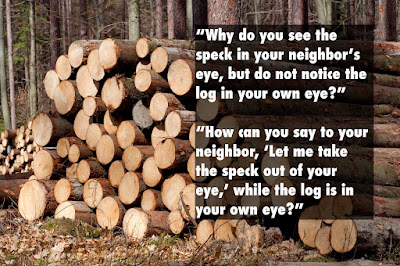Matthew 7:1-6 Do Not Judge
I have written in another place about Jesus' command, "Do not judge." So in this post I would like to write about how one actually obeys that negative commandment. It is obvious that one cannot avoid judging by simply deciding not to do it, that is a certain way to guarantee failure. But one can only become the kind of person who does not judge, by viewing people in a different light, if you will.When we judge, what we are really doing is standing above another person and claiming to by God. This is why Jesus calls such a person a "hypocrite." For a hypocrite in Jesus day was simply an actor. It was one who stood behind a mask and took on the persona of another person – a king, a pauper, a slave, and in the case of judgement, God.So to judge (condemn) is not merely to have opinions of people, but when we make judgements about people based off of information that we couldn't possibly have, what we are really doing is saying, "I am God." Meanwhile Jesus says, "you hypocrite!"So how do we avoid being judgmental? How do we avoid playing the hypocrite and standing in the place of God? The answer to that question is found in the questions Jesus poses to us:
Well? Why does one do that? The only way to answer that question is by understanding what the log is. Many believe that the log in the eye is sin, that Jesus is saying, "Since you're all sinners, none of you has room to judge." But can this really be what he is saying? If that were the case, one would have to admit that it is possible to remove sin from one's life here on earth. For Jesus says, "first take the log out of your own eye." But I think it is safe to say that Jesus isn't advocating for complete sinlessness before helping another person. So what is he suggesting the log is?I think that Dallas Willard is correct when he suggests that the log in the eye is itself condemnation. Just as to a hammer all things are nails, so the one with condemnation (might we call them 'fault finding lenses'?) in their eye will see everything as worthy to be condemned. And to such a person Jesus says, "You hypocrite, first take the log out of your own eye, and then you will see clearly to take the speck out of your neighbor's eye."But how does one do that? How does one obey the negative command, "Do not judge?" The answer is found in Matthew 6 where Jesus taught us to live in view of God and God alone. That involved giving, it involved praying, it involved fasting, it involved investing our treasures, it involved not worrying, but trusting God, and now it also involves the way we see one another.See, it's only when one endeavors to live in the light of God, when a person looks through a different lens, if you will, that one will see all things by the illumination of that light. Seeing things in this light will free one to simply be who they are, allow God to be who he is, and let their neighbor live in responsibility to God. That is how to obey the command, "Do not judge." It is by living and seeing all things in the light of God.But the problem of the speck remains, doesn't it? Our neighbor still has a speck in their eye. And Jesus says that removing the log from one's eye will enable one to see clearly and help remove the speck from the eye of a neighbor.So now we have taken out our condemnation glasses. We no longer feel the need to play the condemning game. How does one go about helping their neighbor? Well, what shouldn't be done is anything forceful. We shouldn't give our holy things to dogs, or cast our pearls before pigs.What does that mean?Is he saying that some people are just so unworthy that one shouldn't waste time on them? You wouldn't believe it, but several commentaries think that Jesus is saying that. They think that Jesus, after telling us not to condemn other people, would himself turn around and say, “Some people are just not worth your time, they're just dogs.”
See, by throwing your holy things to a dog, you are assuming that the holy item, maybe a bible, is what the dog needs. But dogs can’t be nourished on bibles, right? And if a pig is hungry, a pearl does nothing for it. Therefore, when we assume that something we have will help another person, and we force it on them, that is just another way of judging them. It’s just another way of us standing over them in condemnation.
So how do we get it out? How do we help our neighbor get the speck out? We'll see next time.

